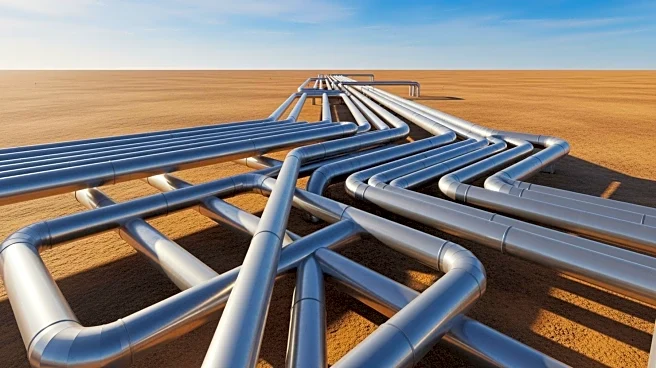What's Happening?
Chevron has agreed to sell its Denver-Julesburg Basin pipeline assets for over $2 billion, as part of its strategy to streamline operations and focus on more profitable ventures. This move comes in the wake of Chevron's recent acquisition of Hess Corp,
which has bolstered its reserves but also impacted its earnings due to merger costs. The company reported a decrease in earnings per share in Q2 2025 compared to the previous year, largely due to weaker oil prices and the costs associated with the Hess acquisition. Despite these challenges, Chevron continues to return significant capital to shareholders, maintaining a strong dividend yield.
Why It's Important?
The sale of pipeline assets is a strategic decision by Chevron to optimize its portfolio and focus on high-return projects. This is crucial as the global oil market faces an oversupply, with OPEC+ increasing production, leading to lower oil prices. For Chevron, divesting non-core assets allows it to allocate resources more efficiently and potentially improve its financial performance amidst these market conditions. The company's ability to maintain shareholder returns through dividends and buybacks is a positive signal to investors, highlighting its financial resilience despite the challenging oil market environment.
What's Next?
Chevron is expected to continue its focus on cost-cutting and divestment of non-core assets to strengthen its financial position. The integration of Hess Corp is anticipated to enhance Chevron's production capabilities, particularly in offshore oil projects. Analysts will be closely watching Chevron's upcoming Investor Day for further guidance on its growth strategy and capital spending plans. Additionally, the company's performance in the next quarter will be critical in assessing the impact of its recent strategic moves and the ongoing volatility in the oil market.
Beyond the Headlines
Chevron's strategic shifts underscore the broader challenges facing the oil industry, including the transition to renewable energy and regulatory pressures. The company's focus on divesting non-core assets and investing in high-return projects reflects a need to adapt to these long-term industry trends. As the energy landscape evolves, Chevron's ability to navigate these changes will be pivotal in maintaining its competitive edge and ensuring sustainable growth.















